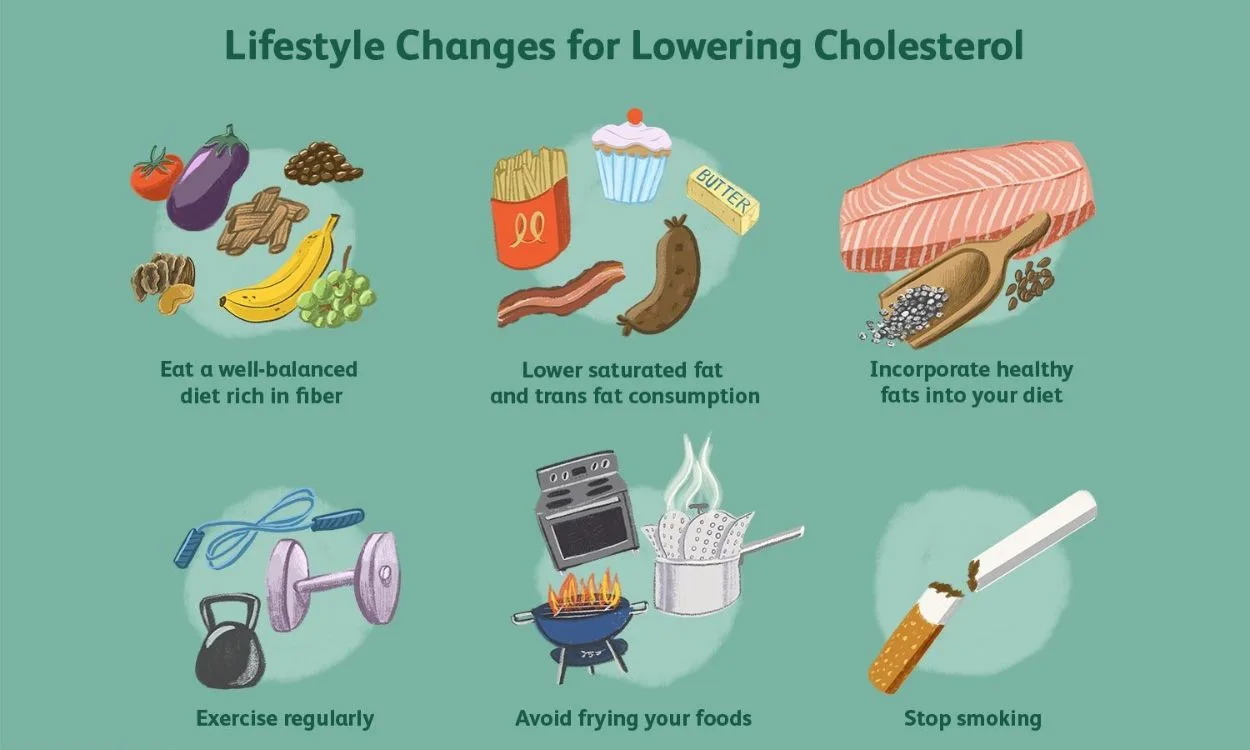How Can I Lower My Cholesterol Levels?
Understanding Cholesterol
Cholesterol is a waxy, fat-like substance that is found in the cells of your body. It is important for the production of hormones, vitamin D, and bile acids that help digest fat. However, having too much cholesterol in your blood can be harmful to your health. High cholesterol levels can increase your risk of developing heart disease, stroke, and other cardiovascular conditions.
Types of Cholesterol
To understand how to lower cholesterol levels, it is essential to know the different types of cholesterol:
- Low-density lipoprotein (LDL) cholesterol: Commonly referred to as “bad” cholesterol, LDL cholesterol carries cholesterol particles throughout your body. When there is an excess of LDL cholesterol in your bloodstream, it can build up in the walls of your arteries and form plaque, which can lead to blockages and reduce blood flow.
- High-density lipoprotein (HDL) cholesterol: Known as “good” cholesterol, HDL cholesterol helps remove LDL cholesterol from your arteries and transports it back to the liver for disposal. Having high levels of HDL cholesterol is beneficial for your heart health.
- Triglycerides: Triglycerides are a type of fat that is stored in your body for energy. Elevated levels of triglycerides can contribute to the hardening of arteries and increase the risk of heart disease.
Lowering Cholesterol Levels
Lowering cholesterol levels involves making lifestyle changes and, in some cases, taking medication. Here are some strategies to help lower your cholesterol levels:
- Healthy Diet: Eating a heart-healthy diet is crucial for managing cholesterol levels. Incorporate the following into your daily meals:
- Fiber-rich foods: Include whole grains, fruits, vegetables, legumes, and nuts in your diet. These foods can help lower LDL cholesterol levels.
- Healthy fats: Opt for foods rich in monounsaturated and polyunsaturated fats, such as avocados, olive oil, nuts, and fatty fish. These fats can help increase HDL cholesterol levels and reduce LDL cholesterol.
- Limit saturated and trans fats: Reduce your intake of saturated and trans fats found in red meat, full-fat dairy products, fried foods, and processed snacks. These fats can raise LDL cholesterol levels.
- Omega-3 fatty acids: Include sources of omega-3 fatty acids like fatty fish (salmon, trout, and sardines), chia seeds, and flaxseeds. Omega-3 fatty acids have been shown to reduce triglyceride levels.
- Regular Exercise: Engaging in regular physical activity can help raise HDL cholesterol levels and lower LDL cholesterol levels. Aim for at least 150 minutes of moderate-intensity aerobic activity or 75 minutes of vigorous activity per week. Additionally, incorporating strength training exercises can be beneficial.
- Maintain a Healthy Weight: Losing excess weight can help improve your cholesterol profile. Focus on achieving and maintaining a healthy body weight through a combination of a balanced diet and regular exercise.
- Quit Smoking: Smoking damages your blood vessels and lowers HDL cholesterol levels while increasing LDL cholesterol levels. Quitting smoking can have a positive impact on your cholesterol and overall health.
- Limit Alcohol Intake: Excessive alcohol consumption can raise triglyceride levels and lead to high cholesterol. If you choose to drink alcohol, do so in moderation. For men, it is recommended to limit alcohol to two drinks per day, and for women, one drink per day.
Fitpaa App – Your Partner in Achieving Healthy Cholesterol Levels
If you are looking for personalized guidance and support in managing your cholesterol levels, the Fitpaa app can be a valuable tool. Fitpaa provides a comprehensive approach to health and fitness, utilizing AI-driven technology and a team of experts to help you achieve your goals.
With Fitpaa, you can benefit from:
- Metabolism Assessment: Identify the underlying factors contributing to your cholesterol levels through a comprehensive metabolism assessment. This assessment takes into account various aspects of your life and provides valuable insights for personalized recommendations.
- Personalized Fitpaa Capsule: Based on your metabolism assessment, Fitpaa prepares a personalized capsule that includes a combination of medical therapy, medical exercise therapy, medical nutrition therapy, and cognitive behavior therapy. The Fitpaa Capsule optimizes your metabolism, helping you achieve your health and fitness goals while targeting cholesterol management.
- Real-time Guidance and Tracking: Fitpaa’s real-time guidance technology incorporates habit-building techniques and cognitive behavioral therapy to keep you motivated and on track. The Fitpaa app provides tools such as a virtual workout trainer, diet tracker, performance tracking, and progress tracking to help you follow your personalized capsule with ease.
- Expert Guidance: With Fitpaa, you have access to a team of fitness planners, nutritionists, fitness trainers, and doctors who regularly review your progress and provide support, ensuring that your cholesterol management plan is effective and tailored to your needs.
To experience the benefits of Fitpaa and begin your journey towards healthy cholesterol levels, download the Fitpaa app today. Your well-being is our mission, and we are committed to helping you achieve your health and fitness goals with guaranteed results.
Remember, taking control of your cholesterol levels is essential for maintaining optimal heart health. By adopting a healthy lifestyle, making dietary changes, and utilizing tools like the Fitpaa app, you can lower your cholesterol levels and reduce the risk of developing cardiovascular diseases. Take the first step towards a healthier future today!









